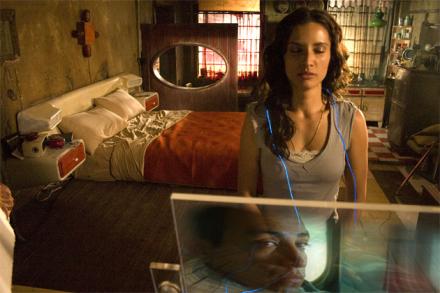 Sleep Dealer
Sleep Dealer
http://www.wired.com/entertainment/hollywood/news/2008/01/sleep_dealer
PARK CITY, Utah -- Tech will not set you free. At least that's the message of Sleep Dealer director Alex Rivera's impressive, eye-opening debut. Set in a futuristic world of have-nots, where 21st-century gadgetry sucks resources from the world's poor and channels them to its wealthy, the film premiered to enthusiastic response Friday at the Sundance Film Festival.
In Rivera's film, Mexican villagers are forced to buy water for their crops from an armed, English-speaking robot. Most of the village's healthy men have bolted for Tijuana to look for work in cyberfactories. And the multinational imprint is seen almost everywhere.
It's a timely message, deftly delivered by a self-described "digital media worker" and immigrant's son who has become a fixture on the experimental video scene.
"We are being sold a false bill of goods, that the more connected we become the more equal we will be," Rivera said during an interview from Sundance's headquarters in Park City. "Statistically speaking, that's not what's happening. The more connected we become, the more we are divided."
Sleep Dealer is remarkably topical for a film set in the future (albeit one described by Rivera as taking place "five minutes from now"). Central themes include outsourcing, corporate ownership of water, remote warfare, confessional internet diaries and military contractors who are accountable to no one. It's the rare political film without any reference to contemporary politics; like Blade Runner and other big-brained sci-fi flicks, it's about ideas, not selling merchandise.
"I love gnomes and goblins and elves," said Rivera, who's made a name for himself touring museums and festivals with his award-winning shorts. "But what I'm really interested in is speculative fiction. I wanted to use this film to ask the question, 'Where are we going?'"
Sleep Dealer tells the story of a young campensino named Memo whose DIY radio draws unwanted attention from a U.S. military contractor. Fleeing to Tijuana, Memo has implants placed in his body in order to become a "node worker" -- a Mexican laborer who, from south of the border, taps into a vast network that operates robots located in the United States.
Memo's robot welds girders on a skyscraper. Other node workers perform housework, watch the kids and keep the yard neat. The film's title refers to the node workers' exhaustion as they work 12-hour shifts to build, clean and maintain cities they'll never visit.
In Tijuana, Memo becomes entwined with a Latino military contractor, who operates drones around the world from his base in San Diego, and an aspiring journalist who sells her memories -- the blogs of the future -- online.
Rivera said the inspiration for the film came from a Wired magazine article about the emerging "global village." It was published around the same time that the U.S. government began building walls along the country's border with Mexico.
That ironic juxtaposition started Rivera thinking: What if technology could extract the life force from the Mexican population and send it north?
"The problem is that the worker comes with a body," Rivera said. "That body needs health care, and gives birth to children that need to go to school. So keep the body outside of the United States. Suck its energy and leave the cadaver or the problematic shell out of the picture."
He began writing Sleep Dealer in the late 1990s, collaborating on the script with former Sundance award-winner David Riker. As the years passed, real life began making gains on Rivera's dystopian vision.
"Films like Star Wars use terms like empire and rebellion, but they are bandied about in bland ways -- powerful words used to describe nothing," Rivera said. "One of the original propositions of my film is that we (create that sense) of a world divided between wealth and power."
Despite being shot on what Hollywood producers would consider an impossibly miniscule budget (the Los Angeles Times pegged the film's price tag at a mere $2 million), Sleep Dealer looks like a real sci-fi movie. It includes 450 effects shots, and was filmed on evocative locations throughout Mexico.
Its weighty subject matter is leavened by Rivera's trickster-like sense of humor. At a party, elders in village garb dance to "old-fashioned" techno music. A booth at a seedy bar advertises "Live Node Girls." And back-alley node jobs are provided by "coyoteks," a pun on the coyotes who smuggle today's undocumented workers into the United States.
Sleep Dealer serves up a radical vision of a troubling tomorrow, injecting viewers into a high-tech, developing-world future.
"Science fiction always tells outsider stories, with people coming into conflict with the system," Rivera said. "But I wanted to create a science-fiction point of view that we've never seen before. We never see films about the future of Mumbai or Mexico City. Just yanking the point of view out of London, or New York, or Los Angeles and dropping it somewhere else is a powerful gesture."